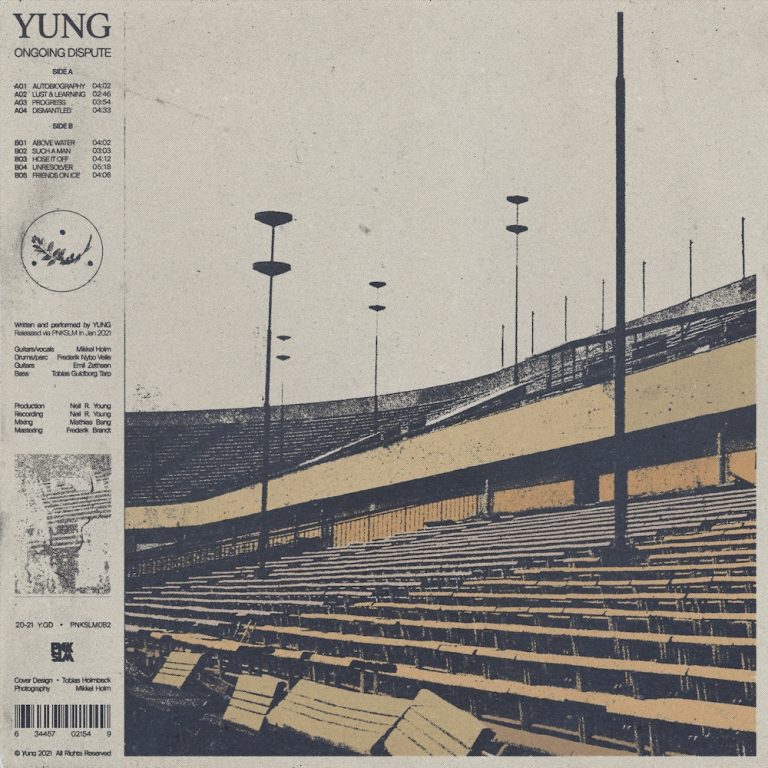It’s funny how fast discourse can turn. Here we are, not even a decade removed from all the think pieces that heralded ‘the death of guitar music’, and one lockdown later, we find ourselves in a collective discussion of which post-punk band released the better album – Shame or Black Country, New Road. While the now-concluded Trump and Brexit era brought forth only painfully few albums that can be read as political responses, 2021 happens to be ripe with young bands intent on formulating what they see wrong with the world, taking cues from melodic post-punk.
Now, maybe Yung aren’t all that young (apologies for the pun), having released their last album five years ago, but the Danish quartet mostly existed south of mainstream recognition, and Ongoing Dispute’s main strength lies in its ability to tap into a youthful attitude. Their mix of laconic dissatisfaction and euphoric melancholy is the type usually found in the works of bands whose close proximity to adolescent combustion allows for a uniquely explosive sound to manifest, a quasi-punk spirit also inherent in the ‘British Indie’ and ‘The-bands’ of the double-0 decade.
While it’s likely that Ongoing Dispute will be framed as post-punk by most, there’s a few noteworthy peculiarities about the band’s sound. Take for example “Dismantled”, which opens on a guitar line similar to that of PJ Harvey’s “Missed”, or the dreamy “Progress”, which almost recalls Placebo’s “Summer’s Gone”. Here and there, shades of early Radiohead (circa Pablo Honey) turn up (“Hose it off”), while other songs seem to invoke Supergrass or Jay Reatard (“Lust and Learning”).
Other times, Yung almost sound like a glam-rock band on an off-day, rushing through saccharine hymns – singalong chorus and all – with wild abandon. Yet the songs never devolve into chaos. Quite the opposite: it’s interesting the see the band enacting so much control over the individual elements and instruments at play. Subjective taste aside: Ongoing Dispute is the rare record which is without flaw – well, besides the imperfections purposefully built into the tightly-designed constructs.
Part of that might be the fraught process of the album’s gestation period. Coming five years after predecessor A Youthful Dream, the individual songs clearly had enough time to marinate. Surprisingly – considering the end product – this time mostly saw Yung’s four members unable to unify their diverging interests (mostly of musical nature), while also suffering from the common burnout associated with the laborious grind of the music business. Now, what sounds like a pretty good bon mot for journalists to mention offhandedly in a review isn’t particularly new or unique: many bands of the past 20 years can tell similar stories, often ending with the dissolution of the unit or a highly schizophrenic end product. Remember how The Department just broke up after a highly hyped debut, or how The Cooper Temple Clause took four years to release a shoddy third album that tried to awkwardly mix their unique brand of post-hardcore with mainstream synth-pop? Yeah, no, I expected you barely would…
It takes a lot more than talent to endure in situations like that, simply because they demand clear vision, muted egos and an ability to actually understand why the alchemical process of combining each member’s individual talent into a greater whole is what got people invested in the first place. So, instead of just aiming for perfectionism, Yung seem to have analyzed the nine songs on display to the point where they themselves understood why they’re not only in love with these tracks, but also what compelled them to the art of music in the first place. Be it in the overlaid guitar tracks of “Autobiography”, the driving drums of “Above Water”, the drunken jangle-pop of “Such a Man”, frontman Mikkel Holm Silkjær’s poignant lyrics, or the rousing bass in “Hose it Off”, the band finds plenty of tension in moments that lesser bands usually use to just drag themselves to the finish line. A song like “Unresolver”, with its slightly stumbling rhythm, brief spoken-word verse, shouted chorus and noisy ending oozes personality and determination.
In the end, there’s a pure, unadulterated joy on display here; a spiritual likeness closer to the early new wave of Killing Joke and The Cure – or aforementioned 90s alternative rock – than to the poetic nostalgia of the indie generation. Which makes sense: Ongoing Dispute is a tale of struggle and survival. It claws its way through pop constructs because it can’t accept death or defeat. And in that, it is authentic punk rock.

